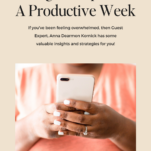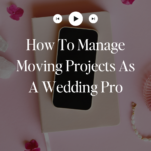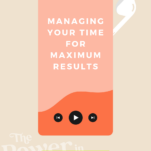Do you feel like every day you sit down at your desk, overwhelmed by the number of tasks you have to manage and already defeated before the day begins? I know that feeling all too well, friend. Being an entrepreneur is hard – and one of the most difficult parts of owning a small business is figuring out how to manage your time. In this conversation, time management expert Anna Dearmon Kornick shares valuable insights and strategies for managing time effectively, especially in the wedding industry.
I'm so excited for you to spend your valuable time today listening to my conversation with Anna. If you've been feeling overwhelmed and overworked, I believe you'll walk away from this podcast episode with an actionable strategy to win your week before it even starts!
Anna emphasizes the importance of prioritization and creating an ideal work week, which is something I ask the women in my mastermind to do when they join! Anna also discusses how to handle curveballs and overcome feeling overwhelmed because, unfortunately, as much as you plan for an ideal work week – it won't always happen. Her practical advice and actionable tips provide a roadmap for better time management and increased productivity.
Our conversation also covered overcoming procrastination, the It's About Time Academy, and the HEART method.
Anna provides practical tips and strategies for maximizing attention, energy, and productivity! Overall, it's one of my favorite podcast interviews to date, and I can't wait to hear your feedback!

In this episode with time management coach Anna Dearmon Kornick on how to win your week before it starts:
- 00:00 Introduction
- 04:07 Anna's Background and Book
- 14:53 Managing Time in the Wedding Industry
- 19:30 Determining and Prioritizing Tasks
- 27:55 Dealing with Overwhelm
- 37:25 Managing Moving Projects
- 46:17 Conclusion

About Anna Dearmon Kornick
Anna Dearmon Kornick is a Time Management Coach, wife, and mom who helps busy professionals master time management so they can stop feeling overwhelmed and start spending time on what matters most. Her advice has been featured in publications like Forbes, Entrepreneur, The Washington Post, Inc., Martha Stewart, The Everygirl, and more.
Anna's book, Time Management Essentials: The Tools You Need to Maximize Your Energy, Attention, and Productivity, is a step-by-step roadmap for living an intentional, purpose-driven life.
Anna believes success and stress don’t have to go hand in hand and that being busy is NOT a badge of honor.
As the host of It’s About Time – A Podcast about Work, Life and Balance, Anna shares time management tips, productivity strategies and real-life advice to help her listeners make the most of their time. In addition to teaching actionable takeaways, Anna interviews other go-getters to find out how they navigate family, friends, fulfilling careers and full schedules.
Building on more than a decade of experience in the fast-moving, high-stakes world of political and crisis communications, Anna knows a thing about using time well. Early in her career, she served as the chief spokesperson for a Lt. Governor, and managed the hectic schedule of a U.S. Congressman. She’s helped small business owners, nonprofits, political candidates, Fortune 100 companies and executives tell their stories and focus on what matters most.
Candice (00:00.258)
How can you win your week before it even starts? Today, I am joined by time management coach, Anna Dearman-Kornick, who's gonna share with you her strategies for better time management. You're here to grow a business, but not just any kind of business. You wanna grow a profitable business with purpose. A business where you wake up every single day driven to serve your customers and make a difference in your own life.
I'm Candice Coppola, published author, business coach, and your guide to building a profitable business with purpose. Join me here every single week as we explore how to build and grow your business with purpose. Get ready to dig in and have meaningful conversations about the strategies and techniques that will help you build your dream business. This is the Power in Purpose.
Candice (01:00.266)
Hey there, friend. Welcome back to the Power and Purpose podcast. It's me, your host, Candice. I have such a treat for you today. Great guest, Anna, is joining me. She's a time management coach, published author, and she knows more than a thing or two about how to manage your time well. I really loved my interview with Anna. I found her strategies to be so digestible and tangible. I know for wedding pros, I know from the women I mentor, from speaking to so many of you.
from chatting with my students, that time management is one of those things that we can never seem to grasp. It feels like we're always holding time like sand through our hands, and we can never fully get everything done on our to-do list. We can never fully find a strategy for managing our time that works. I'm constantly asked, Candice, how do I get it all done? Candice, how do I prioritize my time? Candice, I feel like I don't.
manage my time well and I get nothing done. If that's you, even if it's not you. But I know for many of you guys, you feel that. Today's episode is gonna be such a blessing to you, okay? So bookmark this, come back to it. Anna's advice, her strategies are fantastic. She has also just recently written her first, what I believe is her first book.
It's titled, Time Management Essentials, The Tools You Need to Maximize Your Attention, Energy and Productivity. She's a wife and mom who helps busy professionals master time management so they can stop feeling overwhelmed and start spending time on what matters most. Her advice has been featured in publications like Forbes, Entrepreneur, The Washington Post, Martha Stewart, and now, The Power and Purpose Podcast.
Her new book is a step-by-step roadmap for living an intentional purpose-driven life, and she believes that success and stress do not have to go hand in hand and that busy is not a badge of honor. She's also the host of It's About Time, a podcast about work, life, and balance. There she shares time management tips, productivity strategies, and real-life advice to help her listeners make the most of their time.
Candice (03:12.51)
I know you're going to love today's episode and therefore you should go and listen to Anna's podcast. She is also a time management coach, so she works with folks one-on-one to help them better manage their time. Now she has built all of this with more than a decade of experience in the very fast moving, high stakes world of political and crisis communications. So she understands.
a lot about time management, but then also crisis communications. I think such an underrated skill to be able to manage crisis communications. Earlier in her career, she served as the chief spokesperson for the lieutenant governor and managed a very hectic schedule of a U.S. congressman. So she has, I think, managed time from all different angles. And we are lucky today to have her share with us how we can win our week before it even starts.
Without further ado, let's jump into my episode my interview with Anna. And I welcome to the show. Hi, Candice. Thank you so much for having me. Oh my gosh. I'm so glad you're here. I feel like you're here to say to save us from ourselves today talking about time management. Well, let's see what we can figure out together. Yeah. We have 30 minutes to try to get our lives together. I feel like we're gonna leave this interview having better strategies for managing our time. I make a joke but I mean it
literally every day people ask me Candace, how can I manage my time better? And I feel like it's such a loaded question. But you are a time management expert. And this is your expertise. Yes. And I love that question. Because the answer is always really annoying. Because it's like being an attorney. It depends. How do you get your time mess together? It depends. Depends on what the messes. That's such a great point. Well, I think we're going to explore maybe the mess in generalities
most of our messes, so to speak. Because I feel like while our circumstances are all unique, we do kind of all operate from the same places of not being able to manage all of our tasks or that overwhelmed feeling, can't do it all. I mean, it just comes along with entrepreneurship. Right. I mean, absolutely.
Candice (05:30.594)
often wear so many hats, especially in the very beginning of our businesses. And we look at people who are maybe a few years ahead of us in business, those people who we look up to. And so we try to do everything that we think they're doing. And then we end up feeling like a failure when we can't do it all. But truthfully, no one is really doing it all. No, that's such a great point. We're not.
Candice (06:00.78)
I'm definitely not. I mean, I could share my story and I have many times on this show, but I am definitely not doing it all by myself. Even the things that I am in charge of, I don't always do them well. I don't always do them on time. I don't always get things done the way that it might look like. Yeah, exactly. I'm sure, and you too. I mean, you're a time management coach. I'm sure that it's the same story for you in some cases, right? Oh my gosh, of course.
like to think, I like to ask myself the question, what would this look like if I were aiming for a B minus? So that is my question. So often, you know, I was an A student when I was in high school. So many of us who are entrepreneurs have been driven for our entire lives. We want to do things our way. And a lot of times we want to do things.
perfectly, like our, maybe it's our version of perfect. And no one is asking for us to be perfect. There is no grade. We are not going to pass or fail on this blog post or creating this podcast episode or designing this website or even working with this client. There's no pass fail grade. But man, when we get so focused on making things perfect, we're hard on ourselves. We waste a lot of time on things that don't matter. So my strategy is to just ask myself, okay, what would a B minus look like here? And then let's stop.
because chances are my B minus is going to look like an A plus to people who are looking in from the outside. And I know that's going to be the same with so many of y'all listening. What would a B minus look like? Because I bet it's going to be really good. That's such a good, such a good quote. I'm going to, that's going to be one of those things that makes it into a sticky note on my desk. Just as a reminder, what do you have to deliver a B minus, which is
in any other sense of the word in a plus for anybody who's looking in and has no idea how to do what you do, or any of the expertise you have. Yeah, we forget that we are the expert in our areas. Candice, I'm going to let you in on a secret. My website, you'll have to go visit it, check it out. That is a B minus website. Because if I had continued working on every single page within my website to get it to that
Candice (08:10.214)
A plus 100 mark, I would still be working on it. And at some point we have to stop and let the website do its job. So I have a B minus website and I love it. And it brings people to me and it books me speaking engagements and it books me clients and it represents who I am. And it's a B minus. It's great. I love it. Looks like an A plus to me though. So there we go. There's that analogy in action. Now you have a new book out and it's all about time management.
which we're gonna talk about today. And before you teach us how we can win our week, before it even starts with better time management, I'd love if you can just share a little bit more about this amazing book that you've written. Sure, and thank you so much for the opportunity to tell y'all about it. So it's called Time Management Essentials, the tools you need to maximize your attention, energy and productivity. And it's so much fun because my publisher McGraw-Hill is known for their textbooks.
that they create. If you look back at your college bookshelf, if you had one, or maybe you still have books in a closet, chances are some of them are published by McGraw-Hill because they're just known for their education. And so I kind of look at Time Management Essentials as a mini textbook to time management. It's exactly what you need to know as a business owner to manage your time. And it's so much more than just what we tend to think of when it comes to time management.
You know, so often we think, oh, let me get a calendar and let me time block, but there's really so much more to it than that. It's understanding what those productivity pitfalls are. So you can be on the lookout for those things that are going to knock you off course. It's knowing what tools you need to have in your time management toolbox so that you can pull out the appropriate one to solve whatever problem you're facing. You know, whenever I was...
recovering from burnout, I spent 10 years working in the 24-7 world of crisis communications and government affairs where literally every single day of my life was a disaster. And it knocked me down hard to work for such an extended period of time in such a high stress, always on environment. And so when I walked away from that life, I went to Barnes and Noble and started looking for books
Candice (10:32.674)
time management and productivity and goal setting. And I was trying so hard to put all the pieces together. And one book would lead me to two more books, which would lead me then to three more books. And by the time I had finally figured out how to make time management work for me, I was just so frustrated because you shouldn't have to read 37 different books just to feel confident in how you're managing your time and therefore living your life.
And so when I set out to write time management essentials, it was my mission to put everything in one place, you don't have to read 37 different books, you can just read this one. You know, it's so funny that you say that because I think we've all had that experience of going to Barnes and Noble or your local bookstore and trying to find the solution to your problem. You know, I mean, it's a book should exist on this topic. And it should be the essential definitive guide to how to do this. And literally, I can't think of one book that I've read.
I haven't had a chance to read your book. And I believe that it is the definitive guide because you saw you sought it out to be but I haven't found like one place where I can just dig into that one strategy or that one way of thinking about time management and have that solution. Right. And that I mean, that's like I said, that's what I encountered all over again, I mean, over and over again, so many times you'll pick up a book and it's an amazing deep dive on habits. But just
reading a book about habits, and I'm sure we all have this one book about habits that's probably sitting on your bookshelf or on your nightstand, and you think this is going to change everything. Then when it doesn't, you think there's something wrong with you, but it's just because you don't have the whole picture. Yeah, it's true. I'm sure you talk a lot about this too on your podcast.
It's About Time," which is so smart. I love the name. Very catchy, very smart. I love it. All right. Well, let's talk about our wedding pros here. Our beloved wedding pros, our small business owners who are constantly in their own sort of swimming in their own pool of crisis management 24-7. You used to work in government, right? And so you were the chief spokesperson for a lieutenant governor.
Candice (12:40.53)
and then you also manage the schedule of a US congressman. So that kind of crisis management, I feel like wedding planners and really anybody in the wedding industry, it's sort of similar in the level of crisis. It is, I understand. And fun fact, I don't talk about this often, but my very first step into entrepreneurship was as a calligrapher. Well, there you go. I was a calligrapher.
for wedding invitations and I did, I created custom wedding signage. And so I know what it's like to collaborate with a team of vendors that all have very different personalities and working styles and adherence to timelines and what it's like to work with brides and their.
families that have very specific and sometimes conflicting ideas about what they want that finished product to look like. And you're right, just because I worked in crisis communications doesn't mean that's the only form of crisis out there that we have to navigate. Wedding pros deal with it all the time. All day. And just business owners in general, and then stacking the emotional.
sort of investment of weddings and the amount of money being spent and all of those overwhelming responsibilities and working with other people, as you mentioned, which is such a great point. I say this a lot to my students. When I became a wedding planner, one of the biggest things I didn't realize was I was going to be a babysitter for adults, adults who owned businesses who needed me to chase after them, to pay them, to get them to read their emails, to respond to me.
And it can be really frustrating when you work with people, like you said, who have different professionalism levels, but then also their own time management hangups where they're struggling with managing all their tasks too. So you and I both agree, the wedding industry is very unpredictable. And there's so many last minute things that come up and they upend our workday. I think most wedding pros will tell you they can start off the day with the to-do list and then maybe 45 minutes into the day, everything gets thrown into chaos.
Candice (14:53.83)
My first question is how can any wedding pro, planner, photographer, calligrapher manage their time when everything seems to be constantly changing? Gosh, and isn't that the truth? If there's one thing that we've learned in the past few years, it's that curve balls are going to be thrown our way. And in the beginning of having curve balls thrown my way, I would get so frustrated because I would think, gosh.
If I could just have fewer curve balls, navigate fewer last minute unpredictabilities, then I could finally get some things done. And it took me a while to realize that you can't wait for the curve balls to end to live your life because the curve balls are life. And so the sooner that you can recognize and accept that there will always be interruptions, it just depends on what it is, that there will always be curve balls.
It trains you to become more accepting and more resilient when your day does go up in flames. So that first step is really just accepting. I'm gonna get a curve ball today. I don't know what it is, but when it happens, I'm gonna be mentally prepared for it because that keeps you from stepping into that state of panic that we have all felt before. Well, I had all these plans, okay? So that's the first thing. And then the second thing would be to create a reset ritual for yourself.
This doesn't have to be anything crazy like, okay, my day just went up in flames. Let me meditate for 10 minutes because that doesn't always fit into our days either. We've got to spring into action. Yeah, we're not doing that. We're not doing that. We've got to spring into action because when I say reset ritual, people are like, what? Instead, it's just a super quick thing that you do.
or a song that you listen to, or a closet that you close yourself in and scream as loud as you can, whatever it is, that just helps you process that, okay, shit just hit the fan. I've gotta keep going. Let me hit the reset button and step away from this feeling calm and prepared. So this is your signal to yourself to feel calm and prepared. So again, that could look like screaming into a pillow.
Candice (17:11.966)
It could look like turning in a circle three times. For me, I love to listen to the song, Wait For It from the Hamilton soundtrack because it always just, it pumps me up and calms me down at the same time. So if I am really having one of those days and the lyrics themselves remind you like I am the one thing in life I can control. And when it comes to a crazy situation, we
are the one thing in life that we can control. And so that has always been my, not always, but in the recent years, that has been my reset ritual. Because when you have this reset ritual, it's a physical activity that sends a message to your brain that, all right, I gotta make this happen. And so you're able to step into it feeling calm and prepared. And then the third thing that I would recommend whenever your day goes up in flames,
actually has to happen long before that day begins. And that's having what I like to call an ideal week in place for yourself. And I talk about it in my book, Time Management Essentials, and it's essentially having a framework for your week. Now it doesn't necessarily have to be meticulously planned down to the minute with first on Tuesdays, I will do this for 30 minutes, and then I will do this for 45 minutes. Instead it's...
just a loose framework of what your week would look like if you were to have that ideal week. Suspend reality, perfect world, what does that look like? Because when you have that framework, when you've dreamed up, okay, what does this week look like? It's like having a set of train tracks. And when a curve ball comes your way and you get knocked off track for your day, you have something to go back to. You have a track to get back on.
because so often when we step into our week winging it, because we think, well, I'm going to have 27 curveballs anyway, so what's the point in planning my week? What happens is that we use, we lose valuable minutes of productivity because we're trying to figure out what we're going to do next. So starting with a plan gives you something to go back to. So good. Curveballs, agree with you 100%. They're going to happen. And I love the way that you...
Candice (19:30.614)
shared with us how we should anticipate them. They're a part of the work we do, and you're never gonna have a perfect day or a perfect wedding, so accept that you're gonna get a curve ball, and instead of allowing it to offset you or to create chaos in your work, see it as an obstacle that you can move past to get back on track in your ideal work week. And I love the ritual, the reset ritual. As you were describing that, I...
knew my reset ritual because I never seen it as such. And I'm sure our listeners are thinking, oh, actually, anytime things get upended in chaos, this is what I tend to do to kind of center myself. I clean, right? So my reset ritual would be I'll go do the dishes or I'll go start organizing or I'll throw a load of laundry and I feel like that nervous energy needs to leave my body and it needs to go somewhere and that's my reset ritual. And now that I know that I...
do that and that's the purpose of it, I'm gonna lean into it actually. Yes, do it, lean into that. And how productive is that? Your reset ritual is cleaning your house. So it's like a double whammy, way to go, love that. Yeah, I love that about me too, that's great. I love that about you too. See, you can get your new house. I know, how fantastic. Hey there, Wedding Pro, I wanna share with you what I use to send professional invoices, secure payments, create ironclad contracts.
schedule appointments quickly, and do this with some powerful automations. If you've been looking for a software that can do all of that, plus more, I want to invite you to sign up for a free trial with our partners over at HoneyBook. I've been using HoneyBook since 2013. It's been almost 10 years. And I could not do business without it.
Candice (21:23.686)
and my customers so that I can focus on what I do best in my business. If you'd like to learn more about HoneyBook, go to CandaceCoppola.com slash HoneyBook to learn more and sign up for a free trial. When you use the code PURPOSE, you'll save 50% off your first year subscription. That's CandaceCoppola.com slash HoneyBook. So you mentioned the ideal work week. I love an ideal work week. I live by an ideal work week.
And I'm wondering if this goes into my next question about how can wedding pros determine and prioritize their most impactful tasks each week. I'm thinking this kind of leads into that question. Definitely. So that's such a great question because so often I find that when left unchecked, our to-do lists are filled with the most urgent things that we need to do. And so our entire days.
are less about being proactive and less about setting the stage for our business and our work based on our terms. And instead we are living in reactive mode based on our clients' needs and requests and based on our upcoming deadlines. That seems to be the default way that so many, and not just wedding pros, but so many people in a number of industries.
are living in reactive mode. And reactive mode helps you get things done, but you also get to the end of the week and you realize, oh, I really need to respond to leads. I need to do some outreach. I need to plan my social media content. I just photographed or planned a gorgeous wedding and those pictures are just collecting dust on my computer. We get so caught up in the reactive that we're not carving out time to do that.
proactive, important business building work. And we also make the mistake of telling ourselves, once I do all of this stuff that I need to do, then I'll create my social media strategy, or then I'll take that planner that I've been wanting to collaborate with out to coffee. Once I finish all of this other stuff, newsflash, all of that other stuff, all of that stuff that's on fire is just going to continue coming your way.
Candice (23:46.366)
And so when it comes to thinking about how you want to proactively spend your time in a week, I really like to think of priorities, things that we do in our business as boulders, big rocks, and pebbles. You know, we can picture a boulder. It's giant. If we push on it, it's not going to move. A big rock, smaller than a boulder, but bigger than a pebble. A pebble being like little bitty piece of gravel.
And so a lot of times when we think about priorities, we just think about things that are important, right? Priorities seems to be synonymous with something that is important. And so of course, when you look at your to-do list, everything on it is a priority because if it wasn't important, it wouldn't be there, right? We just wouldn't do it. But when everything feels like a priority, how do we know what to do first? Well, we tend to just start with the easy stuff or whatever we feel like doing or the things that feel most urgent.
And that's when those important things, but those non-urgent things, like building our business, what is it working on our business instead of, instead of in our business, those are the things that get pushed to the wayside. And so I think of boulders as those proactive activities that are not urgent. They're not on fire. Things like planning your social media strategy.
doing outreach, building relationships, listening to this podcast to pour into your personal and professional development, taking courses, improving your craft, all of those things, none of them are urgent. But if we delay and we procrastinate and we put off spending time on those things, eventually they will be urgent because we'll look up and realize that we've gone a month without posting.
anything on social media other than sharing something that we were tagged in, we'll look up and realize that there are changes happening in our industry. People are using AI to do things now, but, and if you're not staying on top of those changes, you're going to be left behind. And so even though those things aren't on fire, they're not immediately deadline based. If we neglect them for too long, they will catch on fire in a real big way. And so I like to think of those types of activities as
Candice (26:06.146)
boulder priorities. Big rocks, big rock priorities are the things that we typically think of when we think of priorities. They're deadline based. It's creating a timeline for an upcoming wedding. It's putting together a shot list. It's hand lettering the signs, whatever it is. It's doing the thing. It's deadline based. It moves the needle. It's a part of a project. And then pebbles, that's everything else. That's categorizing your expenses.
It's making an appointment for something. It's all of those little bitty things that even though they're small and easy, they can really add up and take over our day if we don't watch out. And so when it comes to planning your week, the first thing that we want to place are those boulders. Because when you find space for those boulders first, a little professional development over here, a little social media.
strategizing over here, some content, some advertising, some relationship building over here, then you're able to fill in the space around it with the big rocks, and then you're able to fill in the space around that with the pebbles. And so that's the way that I love to approach planning an ideal week, because you're thinking first about those proactive activities, and then you're bringing in space for all of the urgent little things.
I'm thinking, what are my boulders? What are my big rocks? What are my little pebbles? That visualization of understanding size and scale, and then what falls into each individual category is really such a great way to think about time management. The concept of priorities just doesn't have to be so abstract and complicated. And so let's turn it into something that we can touch and feel and think of. And I would even challenge you this.
If you're listening next time you create your to-do list for the day, write a P, a little lowercase P next to your pebbles. Write a BR next to your big rocks and write an uppercase B next to your boulders because you'll start training your brain to think about the things on your list, not just as things to do, but as different types of priorities that are going to make different types of impact in your life and your business.
Candice (28:22.486)
So when is your planner coming out? Like when do we get to go to the store and buy your day planner that has the big rocks, the boulders and the pebbles like already baked into it? Oh, that is so kind. Thank you so much for that encouragement. I will have to start working on that. We'll see, maybe we'll see a 2025 planner come to existence. We'll see.
Pretty sure that everybody listening was just like, I should do that in my planner, but I wonder if she has one that does this already for me. Just a little business idea that I – not little. I think a great one, honestly, if it's interesting to you. I would buy it. I would buy it so that this system is like in the paper for me and it's kind of mapped out. Very smart. I'm actually going to use this. I think this can help me too because for so many of us and for so many wedding pros, they hear about block scheduling, batch working.
time blocking, all these different, and these are all different tools you can use, right? There are strategies that do work for some, and they try to make them work for them, and they tend to fail at it because it's too regimented, it's too much at once, it's not realistic for a day that ebbs and flows and changes with lots of curveballs.
It doesn't account for curveballs at all. It's very regimented. It's very difficult to follow and to go from no structure to like some color coded, crazy ass Google Calendar. This feels way more manageable and also this fits in to those strategies. So like it fits into time blocking. It fits into batch working. It feels very sustainable and manageable. And Candace, that's the thing. You can time block your day to your heart's content. But if you're not...
time blocking the right activities, it's not going to serve you well. Right. Yeah. Well, there you go. I mean, that's a period on that. That's a full sentence. My next question for you is I would love for you to speak to the listener who feels guilty about not getting it all done and feels like they're constantly not prioritizing things well or they suck at time management.
Candice (30:30.974)
or they just suck at their business because they're not able to get everything done. What would you say to that person? Okay, so the first thing I would say is pick up a copy of my book. But the second thing. Love it. The second thing that I would say is that what does all mean to you? What does it mean to get it all done? Because if your perception or your...
understanding of getting it all done means getting to the end of your big giant life to-do list. I encourage you instead of thinking of your to-do list as a finish line to be reached, instead imagine it as a conveyor belt that is constantly moving.
Does anybody remember that episode of I Love Lucy from decades ago where Lucy and Ethel are working in the chocolate factory and everything's going fine, they're wrapping the chocolates and then they kick up the speed of the conveyor belt and they keep coming and coming and they start stuffing the chocolate in their mouth and in their bras and in their hats and it's a total disaster, okay? We are never going to get to the end of our to-do list. It's not gonna happen.
All right, so repeat after me. I am not going to get to the end of my to-do list ever. Okay, so the sooner you recognize that, the better off you'll be. But here's the trick. Here's how we slow the conveyor belt down to get through the day. And I don't want this to sound like, oh, that's depressing. I just have to like get through the day. No. I encourage you to, instead of having one, instead of having one to-do list, have two. Two. A.
to-do list that contains everything that you need to do. And a today list, a list of things that you can just accomplish today. Because if you separate the two, and you have your, some people call it a master list, some people call it a big list, I just like to call it a to-do list, you know, big to-do list. If you have a today list, you're able to put maybe seven things on it. You know, being realistic.
Candice (32:51.774)
about how much time we have in a given day. You know, if you are, if you have set working hours that you choose to work, and I do recommend that you create sort of an office hour schedule for yourself, even though we work for ourselves, even though we can set our own schedules, having some kind of consistent boundaries around our workday, let's say that you're aiming to work between seven and eight hours a day. If you really look closely at that seven to eight hour window and you think about the time it takes for you to ramp up,
You know, we don't just start our day hitting the ground running usually. We ease into it, we check our email, we make our list, we review what's happening, what's the status of projects, and then we start diving in and getting things done. Then we might have a meeting or take a phone call. It takes around 23 to 27 minutes to get into a state of focus, okay? To go from doing something else to getting into a state of focus. Also,
our brains can really only handle focusing in depth on one thing for about 90 minutes. So if it takes us almost 30 minutes to get into a state of focus, plus 90 minutes to work without experiencing that fatigue, that fog, we start making mistakes, law of diminishing returns sets in, that's a two hour block.
to really sink our teeth into something. And most of us are just flitting around from one thing to the next. We jump from an email to an itinerary to working on a seating chart, at just all kinds of different things. But if you were to give yourself three two-hour blocks during your day where you're going to deeply focus on either one thing or a few similar things, that's called a task batch where we group similar tasks together.
you really only have room for three to four of those in a single day. And that's if you're being super efficient. Yeah. Okay. And so that really means that we're only able to get one to two, maybe three truly substantial things done each day. And that's if we have no meetings and we still have pebbles to deal with. And if I were to look at just about anyone's to-do list listening, I would bet you have like 37 things on your to-do list today.
Candice (35:06.098)
Oh yeah, and they're probably all big rocks or they're all, you know, boulders when you think about it. And, you know, the big things that are important that you need to get done. And so whenever you really look at the time you have available in a day and you maybe use time blocking to see, okay, well, let me work on this for an hour and a half, let me work on this for an hour. You quickly see that you don't have as much.
as you realized and that a list with 37 things on it just isn't realistic. It's setting yourself up for failure and shame because you get to the end of the day and you realize, oh I only did seven things on this list, I'm a failure. But when you have a today list, when you have a list that is just dedicated to the things that you'll do today and it's realistic, you're able to say, look at me, I got seven things done today.
And they were seven things that I needed to do and that I proactively wanted to do. It changes the game. It flips the script and you're a winner because you were realistic and you got a realistic number of things done. Yeah. I was gonna ask you a question about expectations, but you've answered it. I think so many of us have unrealistic expectations about what work looks like in a day and how much work can be accomplished. And even how like,
how much work other people are doing in a day. So we have this, I guess we maybe are operating in some kind of unrealistic fantasy world of being able to, like you said, make it to the end of your to-do list. And the today list is way more manageable, way more focused. And if you're realistic about what you can get accomplished, you win at the end of that day because you finish your today list. And if you're feeling really crazy, you might just like stop work when you're done with your today list.
instead of going back to your to-do list and adding more things on to your today list. Amazing. What a concept. I know. What about overwhelm when we're overwhelmed? Because I think, and this is my final question for you, just some tools to work through overwhelm when everything seems to be happening all at once. This is definitely for every entrepreneur, but wedding pros, I think, feel this even more.
Candice (37:25.97)
when your inbox is blowing up, your deadlines are mounting, you need to get your marketing out. You haven't blogged in two years. You know what I mean? Like you've got all these, your mom's texting you there's, you know, you haven't talked to your friends in a year, like there's so many things going on. Halloween Spirit Week is coming up at Hello, like Christmas Spirit Week, and you've got to have the crazy socks and the antlers in her hat day and it's crazy. Like you just you can't seem to
manage it all at once. What's something that we can do to just maybe reset or manage that overwhelm in the moment? Yeah. So one thing that is really important to note about overwhelm, and I found this so interesting when I learned it, is that overwhelm is not a result of the number of hours that we're working.
Because a lot of times I think we equate overwhelm with, oh my gosh, I'm working so much, I'm working so many hours, I'm doing 12 hour days and I'm barely getting anything done, I'm so overwhelmed. Overwhelm is not a result of the number of hours worked. It is a result of the number of different things, projects, requests, activities, people that are vying for our attention. So it's about the number of different things that we are working on versus the number of hours that we're working.
And so one of the very first things that I have my one-on-one time management coaching clients do after we establish what their vision is for the future, we've got to get a handle on right now, or else we're not going to be able to build toward that vision. And so what we do is we create, we create a list of what I call moving projects. So this is your reset, your list of moving projects. You just stop and you make a list of all of the different
things that you are working on right now, all of the different things that are in progress, both on the personal side and the professional side. Because sometimes that overwhelm is the result of things happening on the personal side. And sometimes we discount that because we don't realize that overwhelm is seeping over into the way that we're showing up in our business. And so your moving project list could be based on clients.
Candice (39:42.43)
Each one of your clients could be considered a moving project. If you are working with a number of different vendors, each one of your vendor relationships could be considered a moving project. Your own work within your business, your marketing strategy, your content strategy, your sales strategy, how you are balancing admin and finances.
Prepping for taxes. I'm not ashamed to say that we filed an extension and we just got our tax stuff turned in back in October. That, it was a moving project because there were things that I was having to turn in to my CPA and be in communication with her that added to the capacity in my brain and my calendar.
And so it's kind of a capacity check, asking yourself, okay, what are all of the different things that I'm currently working on? Not the things that I haven't started yet. Those are not moving, but the things that are constantly in motion. A lot of times we don't even realize all of the things on our plate until we stop and we make this list.
because there usually isn't a way for us to see all of this in one place. Even if we use a task management system, or even if we have a spreadsheet that lists every single one of our clients and where we are in the process of working with them. And so seeing this list of moving projects all in one place, you're able to have this bird's eye view of, okay, this is where my time is going. If I feel overwhelmed right now,
Which of these can be paused? Which of these can be paused to pick up later? Which of these can be eliminated altogether by either putting them on a shelf indefinitely, delegating them or giving them over completely to someone else? Or what are the projects that are truly most important? What are the projects that are making you the most money?
Candice (41:45.53)
what are the projects that are taking up the most time? And when you're able to have this bird's eye view of everything that's moving in your life, you're more equipped to make decisions about what to do next. Another great thing to ask yourself is, which of these projects are closest to the finish line? I was talking with a client recently who is in academia and she has three articles, scholarly articles, that are so close to being submitted.
but she keeps starting new ones because the process of starting a new one's just more fun. And so in order to fully focus on those new exciting projects, we've got to wrap up those projects that are so close to the finish line. So we can prioritize getting those done. I mean, what you do with these moving projects depends on what you learn whenever you look at all of them. But without having that bird's eye view,
everything is just going to continue swirling in your head and it's going to continue to make you feel overwhelmed. So get it out of your head and onto paper. Oh, such a great piece of advice. What you do when you do that sometimes is you're able to see that the steps to completion are actually pretty short. For whatever reason, you've been swirling in the chaos and procrastinating on completing the academic paper, so to speak.
for whatever reason, and I think it's important to confront those reasons if you're open to seeing like, why am I not letting go of this? Why am I not completing this? But anyway, yeah. What am I afraid of here? Yeah, what am I afraid of? But what you'll find is that the steps to completion for some things just sometimes require a signature. They require an email to someone. They require 30 minutes or just one day of work.
It can be really empowering actually to see that laid out in front of you. You might get angry at yourself and be like, it's time for you to stop the shit and get it going. It could be the push you need to get whatever it is done so that you can... The conveyor belt's coming whether you like it or not with tomorrow's tasks. Yeah. I love that though. What a great method, a great piece of advice. Anna, I've learned so much from you today.
Candice (43:57.366)
I would love for you to share first where our listeners can pick up a copy of your new book. Oh, well, thank you. And Candace, it's been such a joy to talk with you as well. Head over to time You've got links to pick up the book and I've got around $500 in bonuses that you can download after you pick up your copy that will help you implement everything that you learn inside. Oh my God. So fantastic. And you have an incredible community.
It's called It's About Time Academy. And I'd love for you to share a little bit more with our listeners about it. Well, thank you. So the It's About Time Academy is a one of a kind time management coaching experience. It combines this amazing supportive community of women who are all in the trenches, trying to figure this work life balance thing out for themselves.
We meet once a month for a live coaching session and just dive into what's happening in our lives and how can we make the most of our time? We're not promised tomorrow. And so we really are just feel inspired to cheer each other on as we live each day to the fullest. And then in addition to that awesome community and our monthly coaching sessions.
There's a members only private podcast that walks you through step by step. My entire heart method of time management coaching heart being an acronym for habits, energy, attention, recharge, and time. Time management is not a one size fits all thing. And what, um, what can be so frustrating is trying to copy and paste a system that was made for someone else onto your life and then it doesn't work. So let's.
Let's take these ingredients. Let's take these tools and create something that's just for you. So fantastic. It sounds like everybody's dream, honestly, to be a part of a group of women who are focused on building better lives and managing their time better and learning from an expert like you. So it's so fantastic. I'm going to link all of this in the show notes as well so that you can pop over, get yourself a copy of Anna's new book, Time Management Essentials, The Tools You Need.
Candice (46:17.09)
to maximize your attention, energy, and productivity. I'll also have a link to the It's About Time Academy. So you can go and sign up for that. And if they wanted to follow you on a social media platform, where are you hanging out? Like, where can they go and just connect with you? Come find me on Instagram. I am probably there a little too much, but it's just so much fun. So come find me on Instagram. Love it.
Anna, thank you so much for being such a great guest. I really enjoyed our conversation, and you are a blessing to teach us what you know about time management. Well, thank you so much. It has been my pleasure to join you, and I'm looking forward to staying in touch. All right, friend. Well, what did you think? I feel so energized after listening to this episode. I told Anna off camera.
I feel as though I really learned something from her today and I'm going to take her reset rituals, the idea of curve balls always coming, her encouragement about the conveyor belts of to-do list, the to-do versus the today list, and then also this time management system of your boulders, your big rocks and your small pebbles. I think that's so, it's such a smart way to look.
at task management and prioritizing your day. I'd love to hear what you think of this episode. You can feel free to DM me, comment on social media. Of course, I wanna encourage you to go and check out all of the things that Anna has to offer inside the show notes, including her academy and of course, her book and podcast. All right, friend, I am wishing you better time management. As always, thanks so much for listening to today's episode and I'm here to remind you that there's so much power.
Candice (48:32.076)
in your purpose until next time.
Sign up to receive email updates
Enter your name and email address below and I'll send you periodic updates about the podcast.
Thanks for tuning into today’s episode of The Power in Purpose Podcast. I want to know– what was your biggest takeaway? Head to my Instagram to join the conversation!
Connect with Anna Dearmon Kornick
Explore More Wedding Industry Resources
- 5 Time Management Tips & Secrets For Wedding Pros
- Should You Increase Your Price? How to Know When It’s Time to Raise Your Rates
- 2024 Honeybook Review: The Pros, Cons, And If It’s Worth It
- How To Build A Wedding Business Brand That Doesn’t Compete
- Honeybook vs. Dubsado 2024 Reviews: Which CRM Is The Best?
- Coping With the Career Stress of Being A Wedding Planner During Wedding Season
- The Ultimate Guide to Creating Systems and Processes in Your Wedding Business
- How Do You Know When It’s Time to Go From Solo Entrepreneur to Building a Team?
- Are You a Disorganized Wedding Planner? Let’s Fix That With These Organized Wedding Planner Tips!
For more business tips and a look into my island life, follow me on the ‘gram
A weeks worth of #ootdstyle ✨ I think day 4 is definitely my fav. 😉 Which outfit did you like the most?
I really enjoyed sharing these this week in my stories and want to keep doing it! My question is - do you like this kinda content?! I have an idea I’ve been marinating on that I’m not 💯 sure of just yet… 😉
Happy Sunday!
#ootdroundup #ootdwatch #ootd #ootdshare #ootdinspiration #wfhfashion #wfhoutfit #candicecoppola

Cheers to Fridays, Aperol Spritzes, new friends and summer vibes ✨
just a reminder that I have 4 amazing episodes waiting for you on my podcast all about email marketing, so you can get back to having fun on Instagram ✨🫶🏼
Imagine if you didn’t stress out so much about your marketing because you diversified your sales funnel with more sustainable strategies like email marketing?
maybe you could just enjoy social media a little more and stress about it a little less.
Xo!
#aperolspritz🍹 #fridayintroductions #summervibes #flodesk #candicecoppola #weddingindustry #weddingindustryexperts #weddingpros #weddingprofessionals

Selling is usually hard for everyone. We feel “icky” when we sell, and many of us don’t want to feel pushy or like we are bothering other people with our services/offers. But selling is important. Like, really freaking important. lol
This week, I’m teaching you a selling model that I created for my marketing. Yes, even I struggle (sometimes daily) with selling. It’s the Serve, Serve, Sell Formula, and it will help you tremendously, especially when it comes to email marketing!
📣 COMMENT 137 and I’ll send you a Spotify and Apple Podcasts link to this episode so you can hear more about my sales formula and binge all 4 episodes that are currently live! 🙌🏼
#emailmarketing #emailmarketingtips #weddingindustry #weddingpro #weddingpros #thepowerinpurposepodcast #powerinpurposepodcast #candicecoppola #weddingindustryeducation #weddingindustryexperts #weddingpodcast #businesspodcast #marketingstrategies #flodesk

The best thing I’ve ever bought is a plane ticket to Barbados. Cheers to 10 years of marriage with you ✨✨
10 years ago today we snuck off (sorry friends and fam!) to get married at a small little church on the beach. It felt like I was doing something crazy - we had only been dating for 10 months - but my nerves were quieted by an inner sense of knowing that this was right.
When you know you know. ❤️
I’m so lucky to have a partner where everyday feels like our anniversary. Thank you for giving me a life better than I could have ever imagined, and for being my person. #kistoos #kistoos💞 #10yearanniversary

Some of the links used in this blog post are affiliate links. When you purchase something, our company receives a small compensation at no cost to you. This compensation helps to maintain the cost of creating helpful content, like our podcast, so you can build a profitable business with purpose.

















+ show Comments
- Hide Comments
add a comment